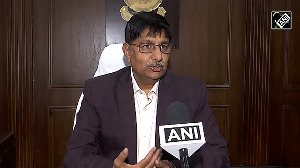To many around the world, Anjali Bhagwat is the face of Indian shooting.
The 34-year-old Arjuna Awardee's exploits have inspired a whole generation to take up the sport.
She is currently ranked sixth in the International Shooting Sports Federation rankings for the 10 metre Air Rifle, her pet event, while in the 50 metre Rifle Three-position, the second event in which she will compete at the Athens Olympics, she is ranked 11th.
 Anjali made history at the Sydney Games in 2000 by becoming the first Indian to figure in the final of an Olympics shooting competition.
Anjali made history at the Sydney Games in 2000 by becoming the first Indian to figure in the final of an Olympics shooting competition.
Since then her performances in the World Championships and Commonwealth Games have made her a name to reckon with on the international shooting firmament.
As gold and glory beckons at Athens, Senior Correspondent Ashish Magotra spoke with the champion shooter to find about her chances in Athens.
How different do you expect the Athens Olympics to be from Sydney 2000?
For starters, I have had time to prepare myself at least psychologically, as I won my place in the Olympic quota in 2002. So I have had time to chalk out my plans. Then, from 2003, I shifted my focus from the Air Rifle to the Three-position because I thought having mastery in both events would help me immensely in the Olympics.
I spent more time on the Three-position and learnt new techniques. I made a very important change; I changed my rifles in both events. It's better to have new rifles to get good accuracy from the barrels. The year ended well with a win in the World Cup, with good scores of 399 (Air rifle) and 583 (in the Three-position).
I worked hard with my new coach, Stanilslav Lapidus, who has actually been appointed by the army. I got special permission from the Shooting Federation of India and trained with him in Mhow for six months. It was under his tutelage that I became a polished Three-position shooter.
I used to be very weak in the Three-position, but now my scores have improved a lot. I am steady. Though my scores are not good enough to be a sure shot for a medal in the Olympics, I know I have a chance.
In the past there were complaints from shooters that the quality of ammunition available to them was not world-class. Has success changed the situation?
Some of the lots are good, but ammunition has to be specific to the barrel. We have only one brand of ammunition available and that is LE, made in Britain. There are a lot of brands available in the market and logic would dictate that we should check them out before deciding on a particular brand.
LE, for instance, does not suit my barrel as it is slow velocity while my barrel needs high velocity ammunition. So my husband, Mandar, went to Frankfurt and got my rifle tested. He also booked a good lot for me. I waited for almost three months to get the import license and it was only in late May that I received the ammunition.
I would have liked to have got it much earlier to test it in the World Cup, or at least in the pre-Olympics, but that was not the case.
Going through all this trouble is worthwhile in the end, because it can give one an advantage of almost 4-5 points. In the Olympics that can be the difference between a medal and none.
While competing in the pre-Olympics trials in Athens were you hampered by the conditions there? I believe that neither the Chinese nor you finished among the medals...
Certainly, in the Air rifle, conditions don't make much of a difference, as it is an indoor event. The lighting, the conditions inside are the same everywhere. But I was focusing on the three-rifle event and the 50m range is always outdoors.
The basic conditions in Athens are very windy and the range is built on the top of the hill. The range is surrounded by hills on all sides, which means that the wind swirls around and makes it very difficult to judge your shots. We are not used to shooting in windy conditions in India and, furthermore, we do not have the electronic target system in India.
[The electronic target system makes a huge difference because it allows the shooters to see how much deviation is caused by the wind, the speed of the wind and the variations caused by the wind. Incidentally, even at the national trials in Bangalore, there was no electronic targeting system in place]
So that's a problem that we are going to face in Athens, but we took a trip to Hungary for a training stint under coach Lapidus of Kazakhstan to get acclimatized.
What do you make of your team-mates, Deepali Deshpande (Three-position) and Suma Shirur (Air Rifle)?
In the Olympics, all the events are individual events, unlike the Commonwealth Games and Asian Games, where we also have the pairs events. And only two shooters from one country can compete in any event as compared to the Asian Games, where there are three from each country.
This is why I have always felt that the Olympics is easier than the Asian Games. Instead of competing with three Chinese shooters, I have to contend with only two. But the Olympics is, of course, the bigger event; you have to handle the pressure.
Deepali and Suma are very good and as they are both from my home state of Maharashtra. I am very happy that I can get some top-quality competition at home.
[Suma is ranked 20th in the world in the 10m Air Rifle while Deepali is raked 52nd in her event.]
You made history by becoming the first Indian to figure in the final of the Olympic Games shooting competition at Sydney 2000. It is that time of the year again; we are close to the Olympics. What memories does it bring back?
That was completely a completely different situation. I was an amateur shooter and I was not very confident either. There were no expectations and I had nothing to lose since I had just started shooting professionally. I was lucky to reach the final. But then, that was the advantage I had. In the final, the rest proved to be too good.
But now I have had good exposure and am confident of my abilities. I have proved myself at the highest level and if that day my shooting clicks, and if I can handle myself well, I can win medals.
How do you deal with the pressure?
Pressure will be there on all the athletes. So, apart from the technical training, we do some mental training exercises and yoga, which helps immensely.
We can talk for hours about what is wrong with the sport. But tell me about the positives...
A lot has changed. The government has also realised we have talent in this event. Our junior teams are performing very well; they have won medals at the World University Games and at the World Juniors too.
Our senior team is winning medals at the Commonwealth Games, Asian Games, World Championships. So the government has started giving us facilities, like ammunition quota. Yes, they have only one brand, but at least they are trying.
Till the Asian Games we did no live firing because we did not have any ammunition. We just did holding practice and went for the Asian Games. And people were expecting us to win medals over there against shooters from China and Korea. We still managed to do well in the 10 metre Air Rifle event. Why? Because we had air pellets and could afford to buy them on our own.
But things have changed a lot since the Asian Games. We get exposure, get ammunition and we can hope for the best in the Olympics.
One final question: what do the Olympics mean to you?
It's a great honour to represent the country. Winning a medal would be amazing. I can't even describe what it would feel like!
Photograph: Getty Images






